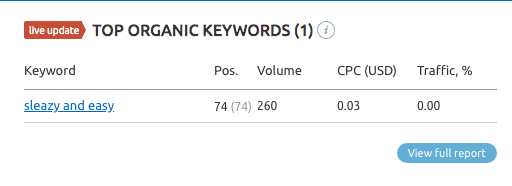Clarity is key. Confusion is the enemy.
In a world that’s slowly moving towards web accessibility (defined in Wikipedia as “the accessibility of a computer system to all people, regardless of disability type or severity of impairment”), it’s worth considering how “consumable” your content is.
Considering accessibility is a good exercise in thinking about content consume-ability.
In a recent screen reader survey, nearly 70% of users skim heading tags to find information on a lengthy page. And nearly 90% of users find headings somewhat to very useful. And yet, the same report posits that only 2% of homepages pass muster re international accessibility guidelines. (via Webaim via a tweet by @mmatuz via Marie Hayne’s newsletter)
For one, content formats can solve for situational contexts (audio for driving, video for tutorials, html content for ease of text-to-speech for the visually impaired).
SEO-friendly plays nicely with accessibility-friendly
If you think about it, your article structure has to be pretty on-the-nose for search engines to get a good sense of what you’re talking about. The same goes for accessibility standards, at least for titles, headings, alt tags, and links.
How often do we draw an analogy in a title or heading, only to watch Google rank us for some partial match on the analogy?
And I wonder how confusing it would be to try to navigate a site without the ability to physically read webpages.
At the time of writing this, contentaudience.com is a few weeks old, and my first ranking?

A sixth page of Google result for an adult site’s branded query. Cool.
And that’s happening even with these on-page headings:
- What’s “unethical” in marketing?
- Defining “ethical” in marketing
- Science and tech make it easy
- Information is power
- Imbalanced cost-benefit perception
- Demand context matters
- The web makes dehumanizing people easy!
Why? Because the keyword phrase is in the permalink. And maybe also the word “easy” is referenced in some h tags. Rookie mistake.
Again, this example isn’t severe. No one is accidentally finding my site in a search for human flesh and instead getting offended by my lengthy post speculating on challenges in ethics when marketing online.
But still.
I’m getting signals crossed with headings, titles, and URL keywords, the supposed easiest wins for search signaling. And now, as I’m realizing, three easy wins for content accessibility.
SEO status quo thinking is that keywords (topics) should go early in the title and H1.
Sometimes this is SEO at the expense of UX, but, I suspect, used as a productive constraint, it could make your content more clear and to the point. And while we should be careful to lump accessibility and SEO together, it can be a useful exercise.
For my post, “why it’s easy to be sleazy with info products,” a better alternative might have been “ethical marketing and info products.” That would have been easier to grasp context at a glance, and led me to a clearer, “what this site is about” type start for search results indexing.
The takeaway? Have clear headlines so that Google, the visually impaired, and your typical users can clearly know what you’re talking about at a glance (or risk being confused with a porn site).
As an aside, I’ve been publishing a fair amount.
On Friday I posted a review and a solution. Neither of which are worth reading if you don’t use Jetpack on a WordPress site or load images on an image heavy site through a CDN.
